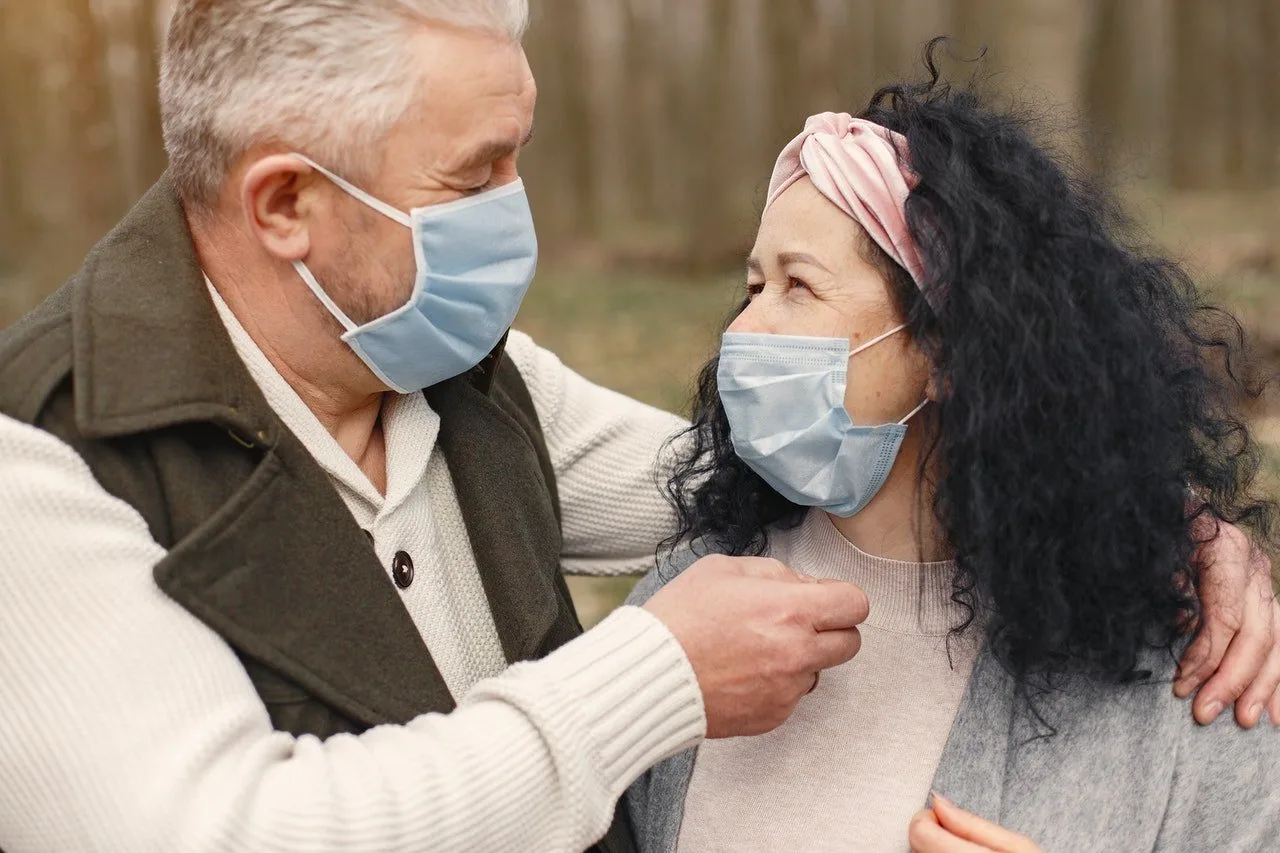This past Wednesday was World Alzheimer’s Day, a day dedicated to raising awareness for a condition that affects over 50 million individuals worldwide. As there is currently no cure for Alzheimer’s, a lot of attention and effort is being put into the risk factors, so that individuals can better manage their risk.
Now, while President Joe Biden has declared that the COVID-19 pandemic is over, the effect that it has had on our health is certainly not. In fact, a recent study has suggested that one of the risk factors associated with Alzheimer’s appears to be a positive COVID-19 test.
COVID-19: A Risk Factor for Alzheimer’s?
Dr. Pamela Davis is a physician at Arline H. and Curtis F. Garvin Research Professor at Case Western Reserve School of Medicine, as well as the aforementioned study’s co-author. Speaking to Medical News Today, Dr. Davis revealed that the study was driven by an interest in COVID-19’s impact on the brain. Dr. Davis and her research team were curious about whether older people who contracted COVID-19 might face a higher risk of developing Alzheimer’s disease.
This is not the first time that Dr. Davis and her team have delved into the link between COVID-19 and a neurodegenerative condition. In fact, a 2021 study featuring Dr. Davis revealed that those living with individuals with dementia were more likely to contract COVID-19 and be hospitalized and die from the disease than those without dementia.
“Many people believe that for Alzheimer’s disease there is a combination of factors that work together to give you the cognitive impairment, and we were concerned that the kinds of things that happened during COVID-19 — the intense inflammation, and perhaps the kinds of direct action on the brain of the of the virus — might be a risk factor. So, we went looking for that in our study.” – Dr. Pamela Davis
The study

Lightspring/Shutterstock
In a study, published in the Journal of Alzheimer’s Disease, Dr. Davis and her team analyzed the anonymous electronic health records of 6.2 million adults aged 65 years or older.
These adults received medical treatment between February 2020 and May 2021 and had no prior diagnosis of Alzheimer’s Disease.
The team then divided the participants into two groups: the first group had contracted COVID-19 between February 2020 and May 2021, whereas the second group had not contracted the disease during that time. This resulted in over 400 000 participants being in the COVID-19 group, while around 5.8 million participants were in the group with no infection.
While gender and age were the same in the COVID-19 and the non-COVID-19 groups, the group that contracted COVID-19 did include more Hispanic and Black participants. The study also noted that the said group faced a “higher prevalence of adverse socioeconomic determinants of health and comorbidities,”
After this, the researchers then analyzed the two groups for risk for a new diagnosis of Alzheimer’s disease. They did the same for three age groups (65 to 74, 75 to 84, and age 85 and older), men and women, and Black, white, and Hispanic racial/ethnic groups.
Does COVID-19 cause Alzheimer’s?
According to the study’s findings, one year after COVID-19 infection, older people almost doubled their risk for developing Alzheimer’s disease.
“COVID may be giving us a legacy of ongoing medical difficulties. We were already concerned about having a very large care burden and cost burden from Alzheimer’s disease. If this is another burden that’s increased by COVID, this is something we’re really going to have to prepare for.” – Dr. Pamela Davis
According to the findings of the study, the risk for older people developing Alzheimer’s disease grew from 0.35% to 0.68% a year after a COVID-19 infection. While the highest risk was observed in women ages 85 and older, the risk for Alzheimer’s disease was still elevated in all age groups, regardless of gender or ethnicity.
Unfortunately, the team did not collect data on COVID-19 severity, and the medical codes for long COVID were not published until after the study had ended.
A link is not a cause
Yes, the study has found an association between COVID-19 and Alzheimer’s disease, but that does not mean that COVID-19 causes Alzheimer’s disease.

Heather Snyder, Ph.D., is vice president of medical and scientific relations at the Alzheimer’s Association. While she acknowledged the study’s findings as interesting when speaking to Medscape Medical News, she cautioned against being too hasty when interpreting the results for a few reasons.
For one, the pandemic caused delays in healthcare and medical diagnoses. As such, Dr. Synder believes that the study’s results could be driven by those who already had Alzheimer’s disease when they were infected but had not yet sought out a formal diagnosis,
“Alternatively, COVID-19 infection — which is linked to immune changes, including inflammation — may impact the onset of brain changes that are linked to Alzheimer’s disease and other dementia. However, because this study only showed an association through medical records, we do not know what the underlying mechanisms driving this association are without more research,” says Dr. Snyder.
She adds that if you have had COVID-19, it doesn’t mean you’re going to get dementia. However, if you have had COVID-19 and are experiencing long-term symptoms including cognitive difficulties, talk to your doctor.
Dr. Davis echoed this sentiment, adding that she does think that this makes it imperative that we continue to follow the population for what’s going on in various neurodegenerative diseases.
Reducing Alzheimer’s risk
If you’re concerned about the association between COVID-19 and Alzheimer’s disease, then we recommend that you get your COVID-19 vaccines and boosters.
Additionally, you can also adopt lifestyle habits that can help reduce your risk of developing Alzheimer’s disease. After all, lifestyle factors are more likely to affect your risk for Alzheimer’s than a positive COVID-19 test.
Countless studies have indicated that the following factors can help mitigate one’s risk for Alzheimer’s disease;
- Following a plant-based diet, with the MIND diet (a combination of the DASH diet and the Mediterranean diet), is found to improve cognitive resilience in the elderly.
- Exercising daily
- Managing your stress levels
- Listening to music
- Socializing
- Completing your daily chores
- Getting quality sleep
Takeaway
According to the World Health Organisation, 139 million people are expected to be living with Alzheimer’s disease by 2050.
This startling number highlights the importance of studies such as the one led by Dr. Davis as more attention should be given to studies looking at factors increasing the risk for Alzheimer’s. The more we know about these risk factors, the better we can protect the cognitive health of our loved ones. .
References
Dhana, K., James, B. D., Agarwal, P., Aggarwal, N. T., Cherian, L. J., Leurgans, S. E., Barnes, L. L., Bennett, D. A., & Schneider, J. A. (2021). MIND Diet, Common Brain Pathologies, and Cognition in Community-Dwelling Older Adults. Journal of Alzheimer’s disease: JAD, 83(2), 683–692. https://doi.org/10.3233/JAD-210107
Wang, L., Davis, P. B., Volkow, N. D., Berger, N. A., Kaelber, D. C., & Xu, R. (2022). Association of COVID-19 with New-Onset Alzheimer’s Disease. Journal of Alzheimer’s disease: JAD, 89(2), 411–414. https://doi.org/10.3233/JAD-220717
Wang QQ, Davis PB, Gurney ME, Xu R. (2021). COVID-19 and dementia: Analyses of risk, disparity, and outcomes from electronic health records in the US. Alzheimer’s Dement. 17: 1297– 1306. https://doi.org/10.1002/alz.12296



![women [longevity live]](https://longevitylive.com/wp-content/uploads/2020/01/photo-of-women-walking-down-the-street-1116984-100x100.jpg)










